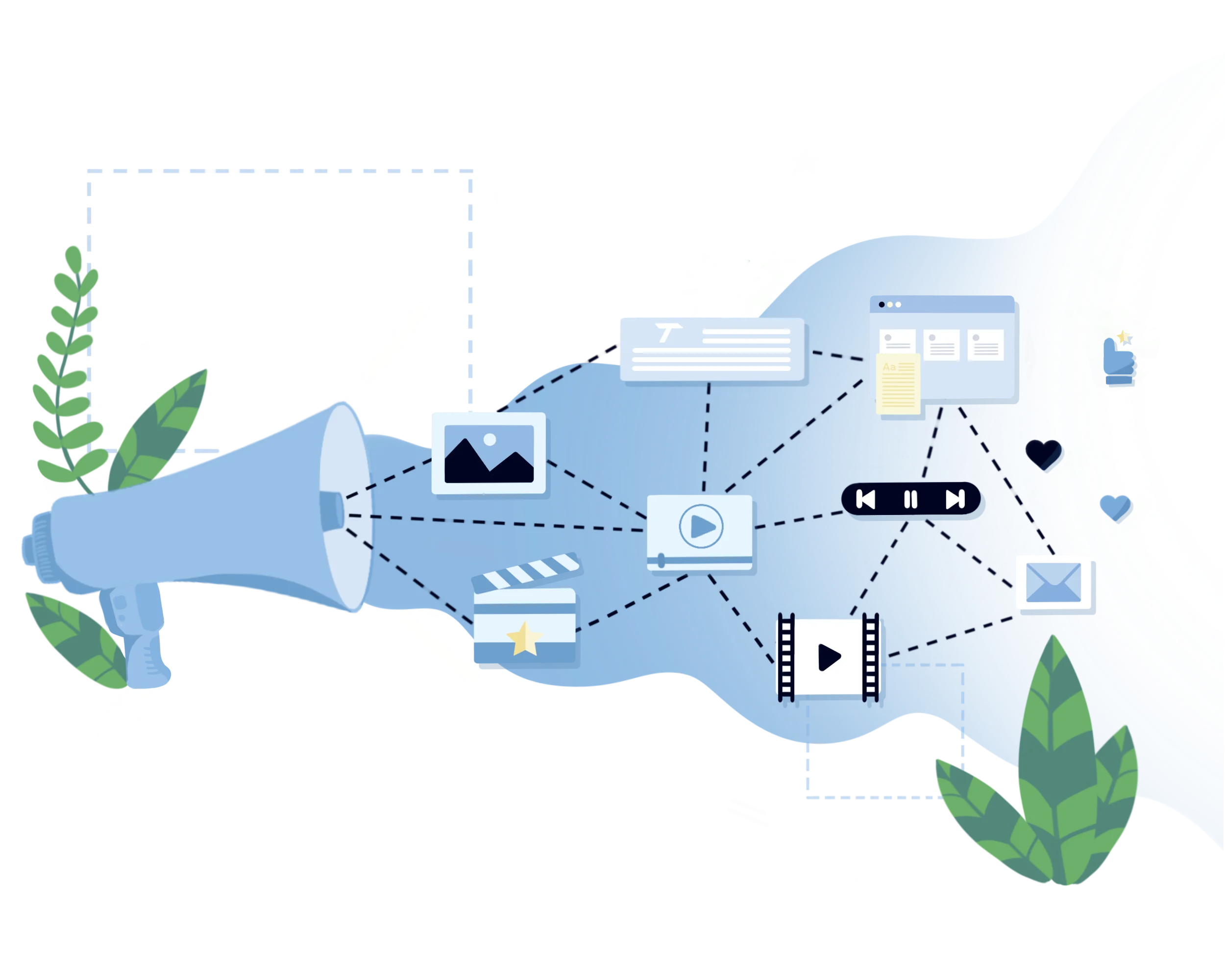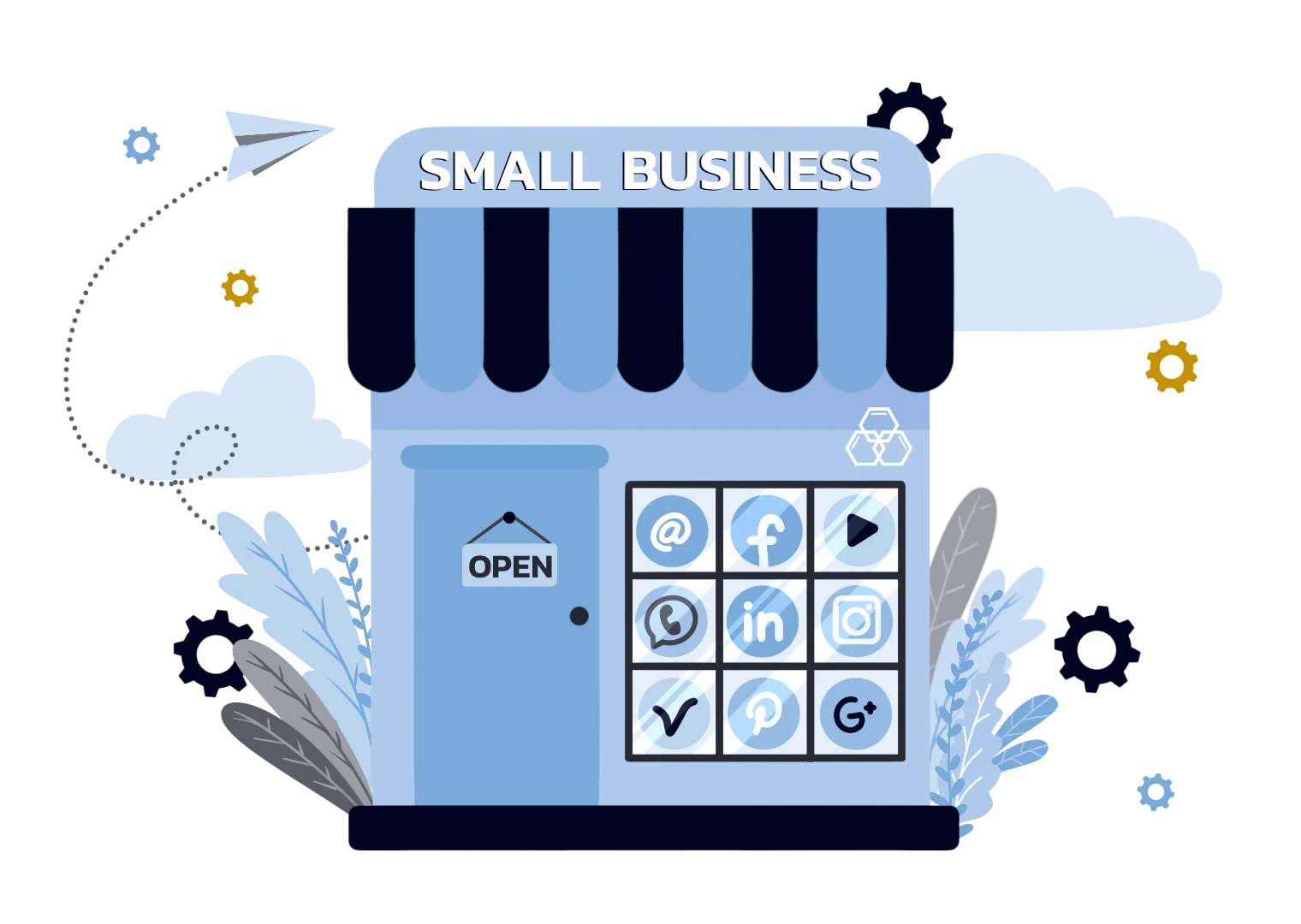A content marketing strategy is the difference between simply posting and connecting with your audience, building trust; achieving real business goals. A strong strategy ensures your content s purpose, direction, and impact. And while content creation process might look straightforward, crafting a results-driven strategy requires time, insight, and experience.
That’s why many businesses turn to content marketing agencies; they bring the expertise, tools, and data-driven approach needed to maximize your content’s performance and keep you ahead of the competition.
But don't worry, here's how experts do content marketing strategy!
What is a Content Marketing Strategy?

A content marketing strategy is a plan to capitalize on existing content and create content that exclusively targets your ideal customer persona throughout the buyer's journey. This type of marketing creates content tailored to the interests, needs, and challenges of your target audience as well as content that promotes your product or service.
When strategically planned and implemented, a content marketing strategy can increase brand awareness, establish yourself as an industry thought leader, generate leads and increased website traffic!
Why is a Content Marketing Strategy Important?

A successful content marketing strategy is the backbone of every digital marketing effort. Here's why
1. Aligns Content with Business Goals
A clear strategy ensures your content efforts directly support broader business objectives like lead generation, customer retention, or brand awareness. It connects every blog post, video and visual content, or social media post, even paid ads, to measurable outcomes, making your content purposeful.
2. Helps You Reach the Right Audience

Without a strategy, content can fall short. A strategic plan includes audience research, persona development, and messaging frameworks that help you create content tailored to your ideal customers' needs, behaviors, and pain points.
3. Drives Consistency Across Channels
A documented content marketing strategy promotes brand consistency across platforms, whether it’s a newsletter, TikTok post, or long-form blog. This consistent tone, style, and messaging build trust and recognition over time, which is crucial for brand identity and loyalty.
4. Optimizes Resource Use and Workflow
With a strategy in place, teams can prioritize content formats, topics, and channels based on what delivers the most impact. It helps prevent wasted time on low-performing content and streamlines production with editorial calendars, templates, and assigned roles.
5. Improves SEO and Discoverability
Strategic content is built around keyword research, audience intent, and link-building opportunities. This approach boosts your visibility in search engines, driving organic traffic to your site and increasing the chances of long-term content ROI.
6. Enables Performance Tracking and Iteration
A strategy defines what success looks like—from engagement metrics to conversions—and allows you to measure progress. By regularly reviewing performance data, you can adjust tactics, refresh underperforming content, and double down on what works.
7. Builds Authority and Trust Over Time
By delivering valuable, insightful, and consistent content, a strategy helps position your brand as a thought leader in your industry. Over time, this builds authority, credibility, and a stronger relationship with your audience.
Types of Content Marketing

Blog Posts
Blogging is a cornerstone of content marketing. Well-optimized blog posts help improve your search engine rankings, keepy your readers engaged, educate your audience, and drive consistent organic traffic. They’re ideal for covering industry insights, how-to guides, and product-related content that answers customer questions.
Social Media Content

Short-form posts, infographics, reels, and live videos on social media channels like Instagram, LinkedIn, TikTok, and X (formerly Twitter) help you engage audiences in real time.
Social media engagement boosts brand visibility, fosters community, and provides a space for direct interaction with your audience.
Videos and Webinars

Video is one of the most engaging formats available. From product demos to customer testimonials and educational explainers, video content helps simplify complex topics and increase retention. Live or recorded webinars also allow you to showcase expertise and interact with your audience on a deeper level.
Infographics
Infographics turn data and complex information into visually compelling content. They’re perfect for social sharing, backlinks, and making your marketing messages digestible. When paired with strong branding, infographics also strengthen visual recognition and authority.
Ebooks and Whitepapers
These long-form content types are ideal for lead generation. Ebooks and whitepapers provide in-depth insights on industry trends, research findings, or solutions to specific problems, making them valuable resources for decision-makers in B2B settings.
Case Studies

Case studies showcase real-world examples of how your product or service solved a problem. They build trust by highlighting measurable results, making them effective tools in the decision stage of the buyer’s journey.
Email Newsletters
Email marketing keeps your audience engaged with personalized updates, exclusive content, and special offers. Newsletters nurture relationships over time and can be tailored to different segments of your audience for higher engagement.
Podcasts

Podcasts are a growing format for thought leadership and storytelling. They offer a convenient way for audiences to consume content on the go and build a loyal community around your brand voice.
Elements of a Content Marketing Strategy

Understanding Your Audience
Knowing your target audience is extremely important when it comes to content marketing. You need to be able to identify a potential customer's needs and desires, determine what kind of outcomes they are hoping for, and craft messages that will resonate with them.
Understanding your audience gives you insight into their communication preferences - this could include the type of content they prefer and even understanding the behavior associated with their demographic. Kelly Lyons from Semrush takes an even more comprehensive by making audience personas to understand the audience better, while we at Evolv have something that we call an Anti-Persona.
Having a clearly defined audience gives you an understanding of how to tell stories that matter to them and how best you can deliver a message that resonates.

Setting Clear Goals and Objectives
Setting clear goals and objectives is a critical element of content marketing. It provides focus to your overall strategy and helps ensure that you are setting realistic expectations for the success of the project.
Without having achievable goals and objectives, it can be difficult to recognize campaigns and initiatives that are not performing as expected or met with any degree of success.
Setting various benchmarks throughout the process, such as analyzing broader industry trends or targeting key audience segments, can help in understanding which elements of your content marketing plan may require further attention and resources for improvement.
Having measurable goals and objectives can be effective in setting benchmarks for success and identifying areas of improvement during the entire project timeline.

Researching Content Topics
Researching content topics involves researching what type of content will be most relevant to your target market and researching the current trends. Doing thorough research for your content topics helps you create more engaging copy that resonates with your audience, adds credibility to your business, and allows you to stay ahead of the competition.
Consider researching potential keywords or topics related to your industry through Google Trends or researching what businesses in the same space produce - this will give you great insight into what type of content works best to attract the right customer base.
After researching potential content topics, narrow down your list and plan out how each will fit into your overall content strategy for maximum success.

Content that Resonates with Your Audience
Content marketing is all about creating content that resonates with the target audience. This means understanding who they are, and what they care about, and knowing how to craft content that speaks their language.
It’s critical to consider factors such as content format, production quality, topics chosen, and even the choice of words when creating content. Content marketing examples include things as simple as a blog post, video content, and paid advertising. You could even use user-generated content, too.
Having a deep understanding of the interests of your target audience will help you create content tailored based on their needs and wants. Going a step further, content should be created with the aim to inform or educate readers in some way: increasing knowledge around a subject matter, offering advice on issues people face in everyday life, or helping people solve specific problems.
Truly remarkable and helpful content will go beyond awareness and make connections to help drive user actions — this is how content really resonates with audiences and leads to amazing results for businesses seeking to achieve marketing goals.

Promoting the Content
Promoting the content of your content marketing effort is where it all starts. Content promoting is an essential element of content marketing which involves the selection, implementation, and analysis of effective channels to share content with potential audiences.
Content promoting includes strategies such as distributing your content through paid campaigns, promoting it on social media, or using email to broadcast articles, videos, and other forms of content.
Selecting the right channels to promote your content can help you reach a broader audience in a shorter time span than traditional methods. The most widely known platforms are search engines and social media platforms. Therefore, promoting content via effective channels should be a priority for any timely and successful content marketing effort.

Measuring Results
Finally, measuring your content marketing campaign's results is essential to ensuring success. Look into your content management system (CMS) what campaigns have had the most success allows you to focus on those strategies and identify which areas of content need improvement or require more attention. Consider reading this piece about website analytics to help you make sense of the data.
When measuring your results, consider measuring the following metrics: engagement rate, return on investment (ROI), and website traffic. These insights will help you determine whether your content strategies are working, and adjust as necessary to improve outcomes such as increasing visitor engagement, ROI, and website visitors.
Knowing what type of content works and which ones don't can make all the difference when looking to achieve maximum success in your content marketing campaigns.
How to create a Content Marketing Strategy?
Creating a content marketing strategy and plan can seem daunting, but it doesn't have to be. A content marketing strategy is essentially the how and why behind the content that you create, aiming to create messaging with a unified, consistent brand voice. The Content Marketing Institute has an interesting write-up about developing a content marketing strategy, but here's what we think.
Start by identifying your target audience and outlining a plan for delivering customized messaging based on where those customers are in their buying journey. After that, it's time to develop the content itself which can include blogs, podcasts, whitepapers, and more.
Lastly, you'll need to create some measurable goals that will help you track both engagement levels and ROI of your content across channels. Caroline Forsey from HubSpot lists a 7-step process that you may also find useful.
FAQs
What are the three recommended stages of content marketing?
The customer journey through of content marketing are: Awareness, Consideration, and Decision. In the awareness stage, the goal is to attract attention through informative or entertaining content. The consideration stage involves nurturing interest and trust with educational or comparative content. Finally, the decision stage focuses on conversion through targeted, action-driven messaging.
What is STP in marketing?
STP stands for Segmentation, Targeting, and Positioning: a strategic approach used to identify and reach ideal audiences. Segmentation divides the market into distinct groups based on demographics, behavior, or needs. Targeting selects the most valuable segment(s) to focus on.
Positioning involves crafting a unique value proposition to stand out in that segment’s mind.
How to make a content plan?
To make a content plan, start by defining clear marketing goals and understanding your target audience. Conduct keyword and topic research based on audience interests and search intent. Create an content calendar that schedules content types, formats, and publishing dates.
Finally, assign responsibilities and set key performance indicators to measure success.
What are the five main types of content marketing goals?
The five main goals in content marketing are: brand awareness, audience engagement, lead generation, customer retention, and sales enablement. These goals help businesses reach new audiences, foster loyalty, convert prospects, and support sales teams.
Aligning content with these objectives ensures that every piece drives measurable impact.
Which is the key to successful content marketing?
The key to successful content marketing is delivering consistent, high-quality, audience-centric content that solves problems or adds value. Understanding your audience’s needs, optimize and repurpose content, and measuring performance are essential. Moreover, having a content marketing strategy ensures that you can look back at it to repeat your success or adapt for a competitive market.
Consistency and relevance build trust, drive engagement, and ultimately lead to long-term business growth.
Final Thoughts
With the right mix of these elements, audience insight, valuable content, and realistic goals, you can easily develop an effective content marketing strategy that forms part of your overall company plan.
By following these simple steps when creating a content marketing strategy, you can ensure that your deliver content that reaches the right audience and achieve goals. Content marketing can be extremely effective in helping businesses reach their objectives but it must be done correctly for maximum success.
You don’t have to do it alone! Partner with Evolv and collaborate with our expert marketing team, which has experience working with both big and small brands. Let us know how we can help keep your brand in front of your audience and attract new customers.







